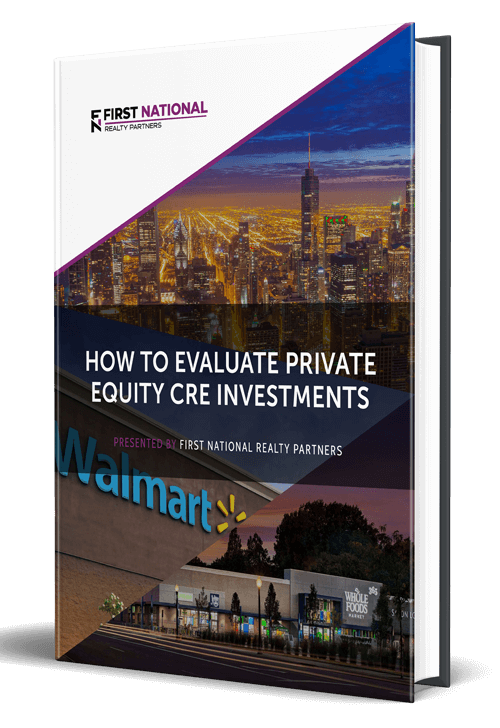When discussing commercial real estate investment/development opportunities, it is often assumed that a property is purchased outright and then a building is constructed upon it. While this happens frequently, it is not always the case. In some cases, a developer can get access to a piece of land through a “ground lease.”
In this article, we will describe what a ground lease is, how they work, and why they can be an inexpensive way to gain access to a piece of land for development purposes. By the end, readers will be able to tell the difference between a subordinated ground lease and an unsubordinated ground lease and will be able to use this information as part of their investment due diligence process.
Although it is not our primary investment strategy at First National Realty Partners, we occasionally come across deals that involve ground leases. For this reason, we feel it is important for our investors to understand this structure. To learn more about our current investment offerings, click here.
Sign Up
Get Access
to Our CRE Deal Flow
Get instant access to all of our current and past commercial real estate deals.
Ground Leases Explained
A ground lease, sometimes called a land lease, is exactly what it sounds like. It is a contract that allows an investor/developer to lease a vacant parcel of land from the owner. The details and structure of the ground lease can vary from one deal to the next, but they typically share the following general characteristics:
- Purpose: The ground lease structure has a specific purpose for both the property owner and the investor/developer. For the investor/developer, it is a low cost way to gain access to a parcel of land in a prime location upon which they can build a project. For the property owner, it is to create an income stream from rent payments, while retaining ownership of the land.
- Term: In order for it to be profitable for both the property owner and investor/developer, the term of the lease has to be long. In some cases, it can reach 99 years. This period of time allows for the completion of improvements and the collection of rents for a period of time long enough to result in a sale that has a capital gain.
- Rent Increases: Because the term of a ground lease can be so long, it often includes built in rent increases through a lease escalation clause that raises the lease rate at regular intervals. Over time, the higher rent can prove to be very profitable for the landowner.
- Ownership: While the property owner retains ownership of the property, the investor/developer has ownership of the improvements upon it. Depending on the specifics of the lease, it is possible that ownership of the improvements may revert back to the property owner at the end of the lease term.
- Rent Payments: In return for the ability to develop a project upon the land, the investor/developer must pay some amount of monthly rent to the landowner. The exact amount is dependent upon the specific characteristics of the deal.
- Default: The consequences for a tenant default on a ground lease can be significant. They could include eviction rights, or even foreclosure, which would revert ownership of the improvements to the landowner or the lenders.
For an investor/developer, one of the challenges of working with a ground lease is obtaining financing for their project. This can be a little bit tricky because a lender normally requires the borrower to provide them with a first position lien on the collateral property as security for the loan. But, this isn’t possible in a ground lease because the borrower does not actually own the land. This quirk leads to two different types of ground leases, subordinated and unsubordinated.
Subordinated vs. Unsubordinated Ground Leases
Because the borrower doesn’t actually own the land, the lender may ask for a “subordination agreement.” With this document, the owner of the property agrees to “subordinate” their interest in it to the lender, which means that the lender’s claim to repayment comes before their own. When they do, this is known as a “subordinated ground lease.” While subordinating their interest certainly presents a risk for the landowner, it may be in their best interest to do it. If they don’t, the lessee may not be able to obtain a construction loan, which means that the property owner may not get the lease payments they desire.
In an unsubordinated ground lease, the owner does not subordinate their interest in the property to a lender.This is more the exception than the norm because a lender typically requires subordination as a condition of loan approval. But, it may be possible in cash deals or rare circumstances where the lender has some other sort of assurance that they will be repaid first.
Ground Leases & Private Equity
Ground leases are found in all types of commercial real estate investments, including those that involve private equity firms. While there are many different scenarios in which one makes sense, we want to highlight one that is commonly found when buying and selling commercial retail centers.
At First National Realty Partners, we specialize in the purchase and management of grocery store anchored retail shopping centers. Often, these centers include a primary strip of inline retail tenants and a series of outparcels that may or may not be developed. We like it when they are undeveloped because this gives us an opportunity to monetize them. For example, we could sell the outparcels to a developer and use the proceeds to pay down debt and/or distribute dividends to our investors. Or, we could enter into a ground lease with a developer, which provides our investors with a steady stream of cash flow by way of the ground rent. This type of strategy is not unique to private equity firms, but it is one way that they utilize ground leases.
Summary of Unsubordinated Ground Leases
A commercial ground lease is a specialized type of lease agreement in which an investor/developer (the lessee) leases a vacant parcel of land from a property owner (the lessor). In return for their rental payments, the investor obtains the right to construct a project on the vacant land.
While every ground lease is unique, they typically have lengthy lease terms, reasonable rental rates, and it is possible that ownership of the improvements could revert back to the land owner at the end of the lease.
To obtain financing for a construction project on a land lease, lenders often require the property owner to subordinate their interest. This means that they voluntarily accept a lower priority in the repayment order while provisioning the lender with top priority. While this arrangement may be somewhat counterintuitive for the land owner, often it may be the only way to get the project off the ground.
In an unsubordinated ground lease, the owner does not subordinate their interest. While this lowers their own risk, it may actually increase the risk that the overall transaction does not get off the ground because the lender often requires a subordination agreement as a condition of loan approval.
There are many different ways that a ground lease can be utilized in a private equity transaction, but one of the ways that we occasionally use it is to ground lease vacant outparcels in the grocery anchored retail centers that we purchase. Doing so provides a way to add value to an investment by developing an additional stream of income.
Interested In Learning More?
First National Realty Partners is one of the country’s leading private equity commercial real estate investment firms. With an intentional focus on finding world-class, multi-tenanted assets well below intrinsic value, we seek to create superior long-term, risk-adjusted returns for our investors while creating strong economic assets for the communities we invest in.
If you are an Accredited Real Estate Investor and would like to learn more about our investment opportunities, contact us at (800) 605-4966 or info@fnrpusa.com for more information.






